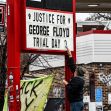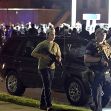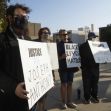At a pre-trial meeting, a Wisconsin judge ruled that the individuals shot by Kyle Rittenhouse cannot be referred to as “victims” but can only be described as “rioters” or “looters,” potentially impacting the outcome of the case and swaying jury members to one side.
The Kenosha County Circuit Judge, Bruce Schroeder, has a long history of not permitting prosecutors to refer to people as “victims” at trial. In this case, he justified the decision by “let ‘victim’ is a loaded, loaded word. And [he] think[s] ‘alleged victim’ is a cousin to it.”
Assistant District Attorney Thomas Binger criticized the move and commented that Judge Schroeder was creating a “double standard” and that the Judge is leaving out of his decision the fact that “rioter” and “looter” are also very loaded terms, “if not more loaded, than the term ‘victim.’” The use or restriction on the use of terms such as these could sway the jury in an unfair and biased manner.
Kyle Rittenhouse fatally shot two men in August 2020 during a protest against a police shooting of a Black man in Kenosha, Wisconsin. The protest evolved after a police shooting of Jacob Blake in August 2020. Rittenhouse was part of an armed civilian group that proclaimed they were solely there to protect and secure businesses due to after-hours looting and arson.
Rittenhouse has pleaded not guilty to three separate charges: felony homicide for fatally shooting Anthony M. Huber and Joseph Rosenbaum; felony attempted homicide for wounding Gaige Grosskreutz; and the misdemeanor of possessing a dangerous weapon while under 18. Video evidence of the night shows Rittenhouse carrying an AR-15-style rifle with a group of other armed men.
Wisconsin Statutes mandate that an individual is guilty of a Class H felony if property is taken either during or after a riot. The penalty for a Class H Felony is a fine not to exceed $10,000, imprisonment not to exceed six years, or both. The penalty for stealing during a riot is hardly comparable to sentencing to death row, especially in the state that was first to ban the death penalty. Interestingly, however, the Death Penalty Repeal Act of 1853 was in direct response to a protest in Kenosha after the execution of Jon McCaffary in 1851 went terribly wrong.
Wisconsin is one of four states that does not define the term “riot” in its state statutes. Republican Representative John Spiros is currently trying to change that. He introduced Assembly Bill 279 (AB-279) into the Wisconsin state legislature shortly after the protests in Kenosha County. His bill separates the term from “protests,” which he claims are “peaceful, pre-organized demonstrations,” while “riots end up risking people’s safety and livelihoods.”
The use of terms and labels can create an impression on the jury. Loaded terms can sway the jury to believe that the individuals who were shot deserved what they got. A CNN Legal Analyst, Areva Martin, commented that the focus of the trial is not on whether or not the individuals who were killed were involved in rioting and looting, but the state of mind that Rittenhouse was in during the event. She remarked that “he didn’t have that information when he pulled the trigger… and the fact that he didn’t know that they were involved in this activity makes…that evidence irrelevant.” Furthermore, Rittenhouse is not a member of law enforcement and cannot make these decisions on what type of punishment there is for rioting and looting.
The outcome of this case could spark racial protests again if it is seen that the Judge overtly favors the defendant. The case is already contentious, but now with the restriction of the use of “victim,” it will be even harder for the prosecution to prove that Mr. Rittenhouse was in the wrong for fatally shooting two and wounding one. The use of the terms “rioter” will focus on the alleged type of character that the individuals were rather than the situation that Rittenhouse was going through in August 2020. He is pleading that he shot the men out of self-defense, which the jury could easily agree to if the defense can keep the idea of “victim” out of the transcript.
The jury selection for the trial will begin on November 1, 2021. In February of this year, Judge Schroeder denied two arrest warrant requests and a request to raise bail after Kyle Rittenhouse moved without properly notifying prosecutors. Judge Bruce Schroeder has been a Judge in the Kenosha County Circuit Court since 1983 and served as Kenosha County District attorney from 1972 through 1977. His current term will end in 2026.






